Ka
Submitted
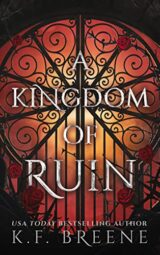
A Kingdom of Ruin (Deliciously Dark Fairytales Book 3)
Too late.
In an effort to save all that I love, I have to finish the job Nyfain started… and ruin myself.
I’ve made a trade with the most cunning creature alive.
Me for them.
The dungeons will be my new home. Dolion’s destruction will be my new goal.
I just have to get out of here and back to my golden dragon. Preferably alive.

Madhouse at the End of the Earth: The Belgica’s Journey into the Dark Antarctic Night
In August 1897, the young Belgian commandant Adrien de Gerlache set sail for a three-year expedition aboard the good ship Belgica with dreams of glory. His destination was the uncharted end of the earth: the icy continent of Antarctica.
But de Gerlache’s plans to be first to the magnetic South Pole would swiftly go awry. After a series of costly setbacks, the commandant faced two bad options: turn back in defeat and spare his men the devastating Antarctic winter, or recklessly chase fame by sailing deeper into the freezing waters. De Gerlache sailed on, and soon the Belgica was stuck fast in the icy hold of the Bellingshausen Sea. When the sun set on the magnificent polar landscape one last time, the ship’s occupants were condemned to months of endless night. In the darkness, plagued by a mysterious illness and besieged by monotony, they descended into madness.
In Madhouse at the End of the Earth, Julian Sancton unfolds an epic story of adventure and horror for the ages. As the Belgica’s men teetered on the brink, de Gerlache relied increasingly on two young officers whose friendship had blossomed in captivity: the expedition’s lone American, Dr. Frederick Cook—half genius, half con man—whose later infamy would overshadow his brilliance on the Belgica; and the ship’s first mate, soon-to-be legendary Roald Amundsen, even in his youth the storybook picture of a sailor. Together, they would plan a last-ditch, nearly certain-to-fail escape from the ice—one that would either etch their names in history or doom them to a terrible fate at the ocean’s bottom.
Drawing on the diaries and journals of the Belgica’s crew and with exclusive access to the ship’s logbook, Sancton brings novelistic flair to a story of human extremes, one so remarkable that even today NASA studies it for research on isolation for future missions to Mars. Equal parts maritime thriller and gothic horror, Madhouse at the End of the Earth is an unforgettable journey into the deep.
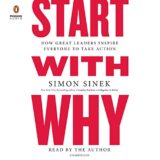
Start with Why: How Great Leaders Inspire Everyone to Take Action
The inspirational best seller that ignited a movement and asked us to find our why.
Discover the book that is captivating millions on TikTok and that served as the basis for one of the most popular TED Talks of all time – with more than 56 million views and counting. Over a decade ago, Simon Sinek started a movement that inspired millions to demand purpose at work, to ask what was the why of their organization. Since then, millions have been touched by the power of his ideas, and these ideas remain as relevant and timely as ever.
Start with Why asks (and answers) the questions: Why are some people and organizations more innovative, more influential, and more profitable than others? Why do some command greater loyalty from customers and employees alike? Even among the successful, why are so few able to repeat their success over and over?
People like Martin Luther King Jr., Steve Jobs, and the Wright Brothers had little in common, but they all started with why. They realized that people won’t truly buy into a product, service, movement, or idea until they understand the why behind it.
Start with Why shows that the leaders who have had the greatest influence in the world all think, act, and communicate the same way – and it’s the opposite of what everyone else does. Sinek calls this powerful idea The Golden Circle, and it provides a framework upon which organizations can be built, movements can be led, and people can be inspired. And it all starts with why.
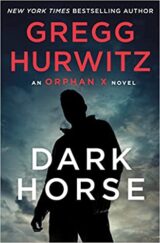
Dark Horse: An Orphan X Novel (Orphan X, 7)
Gregg Hurwitz’s New York Times bestselling series returns when Orphan X faces his most challenging mission ever in Dark Horse.
Evan Smoak is a man with many identities and a challenging past. As Orphan X, he was a government assassin for the off-the-books Orphan Program. After he broke with the Program, he adopted a new name and a new mission–The Nowhere Man, helping the most desperate in their times of trouble. Having just survived an attack on his life and the complete devastation of his base of operations, as well as his complicated (and deepening) relationship with his neighbor Mia Hall, Evan isn’t interested in taking on a new mission. But one finds him anyway.
Aragon Urrea is a kingpin of a major drug-dealing operation in South Texas. He’s also the patron of the local area–supplying employment in legitimate operations, providing help to the helpless, rough justice to the downtrodden, and a future to a people normally with little hope. He’s complicated–a not completely good man, who does bad things for often good reasons. However, for all his money and power, he is helpless when one of the most vicious cartels kidnaps his innocent eighteen year old daughter, spiriting her away into the armored complex that is their headquarters in Mexico. With no other way to rescue his daughter, he turns to The Nowhere Man.
Now not only must Evan figure out how to get into the impregnable fortress of a heavily armed, deeply paranoid cartel leader, but he must decide if he should help a very bad man–no matter how just the cause.
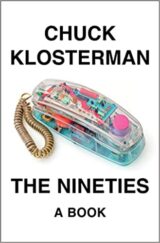
The Nineties: A Book
It was long ago, but not as long as it seems: The Berlin Wall fell and the Twin Towers collapsed. In between, one presidential election was allegedly decided by Ross Perot while another was plausibly decided by Ralph Nader. In the beginning, almost every name and address was listed in a phone book, and everyone answered their landlines because you didn’t know who it was. By the end, exposing someone’s address was an act of emotional violence, and nobody picked up their new cell phone if they didn’t know who it was. The 90s brought about a revolution in the human condition we’re still groping to understand. Happily, Chuck Klosterman is more than up to the job.
Beyond epiphenomena like “Cop Killer” and Titanic and Zima, there were wholesale shifts in how society was perceived: the rise of the internet, pre-9/11 politics, and the paradoxical belief that nothing was more humiliating than trying too hard. Pop culture accelerated without the aid of a machine that remembered everything, generating an odd comfort in never being certain about anything. On a 90’s Thursday night, more people watched any random episode of Seinfeld than the finale of Game of Thrones. But nobody thought that was important; if you missed it, you simply missed it. It was the last era that held to the idea of a true, hegemonic mainstream before it all began to fracture, whether you found a home in it or defined yourself against it.
In The Nineties, Chuck Klosterman makes a home in all of it: the film, the music, the sports, the TV, the politics, the changes regarding race and class and sexuality, the yin/yang of Oprah and Alan Greenspan. In perhaps no other book ever written would a sentence like, “The video for ‘Smells Like Teen Spirit’ was not more consequential than the reunification of Germany” make complete sense. Chuck Klosterman has written a multi-dimensional masterpiece, a work of synthesis so smart and delightful that future historians might well refer to this entire period as Klosterm
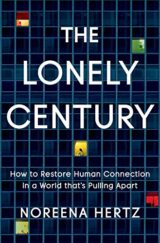
The Lonely Century: How to Restore Human Connection in a World That’s Pulling Apart
Loneliness has become the defining condition of the twenty-first century. It is damaging our health, our wealth, and our happiness and even threatening our democracy. Never has it been more pervasive or more widespread, but never has there been more that we can do about it.
Even before a global pandemic introduced us to terms like “social distancing,” the fabric of community was unraveling and our personal relationships were under threat. And technology isn’t the sole culprit. Equally to blame are the dismantling of civic institutions, the radical reorganization of the workplace, the mass migration to cities, and decades of neoliberal policies that have placed self-interest above the collective good.
This is not merely a mental health crisis. Loneliness increases our risk of heart disease, cancer, and dementia. Statistically, it’s as bad for our health as smoking fifteen cigarettes a day. It’s also an economic crisis, costing us billions annually. And it’s a political crisis, as feelings of marginalization fuel divisiveness and extremism around the world. But it’s also a crisis we have the power to solve.
Combining a decade of research with firsthand reporting, Noreena Hertz takes us from a “how to read a face” class at an Ivy League university to isolated remote workers in London during lockdown, from “renting a friend” in Manhattan to nursing home residents knitting bonnets for their robot caregivers in Japan.
Offering bold solutions ranging from compassionate AI to innovative models for urban living to new ways of reinvigorating our neighborhoods and reconciling our differences, The Lonely Century offers a hopeful and empowering vision for how to heal our fractured communities and restore connection in our lives.

House of Sky and Breath (Crescent City)
Bryce Quinlan and Hunt Athalar are trying to get back to normal―they may have saved Crescent City, but with so much upheaval in their lives lately, they mostly want a chance to relax. Slow down. Figure out what the future holds.
The Asteri have kept their word so far, leaving Bryce and Hunt alone. But with the rebels chipping away at the Asteri’s power, the threat the rulers pose is growing. As Bryce, Hunt, and their friends get pulled into the rebels’ plans, the choice becomes clear: stay silent while others are oppressed, or fight for what’s right. And they’ve never been very good at staying silent.
In this sexy, action-packed sequel to the #1 bestseller House of Earth and Blood, Sarah J. Maas weaves a captivating story of a world about to explode―and the people who will do anything to save it.
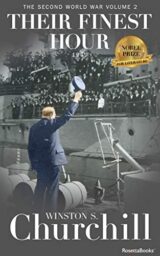
Their Finest Hour (Winston S. Churchill The Second World Wa Book 2)
In Their Finest Hour, Winston Churchill describes the invasion of France and a growing sense of dismay in Britain. Should Britain meet France’s desperate pleas for reinforcements or conserve their resources in preparation for the inevitable German assault? In the book’s second half, entitled simply “Alone,” Churchill discusses Great Britain’s position as the last stronghold against German conquest: the battle for control of the skies over Britain, diplomatic efforts to draw the United States into the war, and the spreading global conflict.
Their Finest Hour is part of the epic six-volume account of World War II told from the viewpoint of a man who led in the fight against tyranny, and enriched with extensive primary sources including memos, letters, orders, speeches, and telegrams, day-by-day accounts of reactions as the drama intensifies. Throughout these volumes, we listen as strategies and counterstrategies unfold in response to Hitler’s conquest of Europe, planned invasion of England, and assault on Russia, in a mesmerizing account of the crucial decisions made as the fate of the world hangs in the balance.

The Human Sales Factor: The H2H Equation for Connecting, Persuading, and Closing the Deal
There’s a science to getting others to buy from you—a secret only the best salespeople, business leaders, entrepreneurs, and thought leaders in the world know: selling, at its core, isn’t really about moving a product or service. It’s about moving people.
Having spent nearly three decades meticulously examining the skillsets required for connecting with others—through the training and coaching of thousands of sales leaders and their teams for some of the biggest brands in the world—bestselling author Lance Tyson has mastered the powers of persuasion and influence, while decoding the intricacies of why people buy from others.
Whether you’re a seasoned professional or an entrepreneur trying to pitch the next great idea—or maybe you just want to get better at getting what you want—The Human Sales Factor: The H2H Equation for Connecting, Persuading, and Closing the Deal is for you. This book is a peek under the hood of Lance’s proven, predictable, scalable process. It’s designed for sales leaders and their teams, yet is still approachable and applicable for the person who just wants to open doors and increase the chances of getting anything they want or need.
Connecting and persuading are no longer soft skills. They are fundamental skills that can help you attract investors, sell products, build brands, inspire teams, and trigger movements.
Despite all the processes, lingo, methodologies, and corporate rhetoric, sales—no matter the industry—has never truly been B2B or B2C. It always has and always will be done H2H—that is, Human 2 Human.

Breaking The Habit of Being Yourself: How to Lose Your Mind and Create a New One
You are not doomed by your genes and hardwired to be a certain way for the rest of your life. A new science is emerging that empowers all human beings to create the reality they choose. In Breaking the Habit of Being Yourself, renowned author, speaker, researcher, and chiropractor Dr. Joe Dispenza combines the fields of quantum physics, neuroscience, brain chemistry, biology, and genetics to show you what is truly possible.
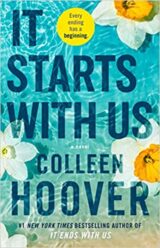
It Starts with Us: A Novel
Before It Ends with Us, it started with Atlas. Colleen Hoover tells fan favorite Atlas’s side of the story and shares what comes next in this long-anticipated sequel to the “glorious and touching” (USA TODAY)
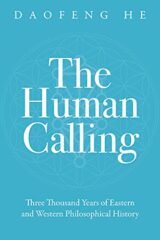
The Human Calling: Three Thousand Years of Eastern and Western Philosophical History
The Human Calling is a vigorously researched and profoundly spiritual narrative history of the world’s religious movements as they relate to society’s collective understanding of the duties they have to fellow people and looks ahead to what lessons from history can be applied as people navigate a technological age.
Focusing on the rise and fall of spiritual movements in both the East and West, The Human Calling examines what the world’s major religions have historically offered, asks what people are here for outside of pure survival, and makes the persuasive argument for Christianity as the best leader to guide individuals on the path toward better caring for one another—our human calling. The Human Calling takes readers through humanity’s three great thought movements:
The first is the Axial Age, the source of the first great human reflection on public spirit and public order
The second is the 12th-17th centuries, wrestles with the question of whether people can attain individual rationality in God’s order
The third delves into the independent reasoning societies of the 20thand 21st centuries and looks forward to what people want their third great reflection on God’s plan to be during their own period of societal flux
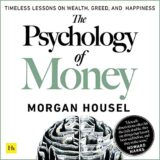
The Psychology of Money: Timeless Lessons on Wealth, Greed, and Happiness
Doing well with money isn’t necessarily about what you know. It’s about how you behave. And behavior is hard to teach, even to really smart people.
Money – investing, personal finance, and business decisions – is typically taught as a math-based field, where data and formulas tell us exactly what to do. But in the real world people don’t make financial decisions on a spreadsheet. They make them at the dinner table, or in a meeting room, where personal history, your own unique view of the world, ego, pride, marketing, and odd incentives are scrambled together.
In The Psychology of Money, award-winning author Morgan Housel shares 19 short stories exploring the strange ways people think about money and teaches you how to make better sense of one of life’s most important topics.
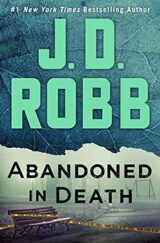
Abandoned in Death
The woman’s body was found in the early morning, on a bench in a New York City playground. She was clean, her hair neatly arranged, her makeup carefully applied. But other things were very wrong—like the tattoo and piercings, clearly new. The clothes, decades out of date. The fatal wound hidden beneath a ribbon around her neck. And the note: Bad Mommy, written in crayon as if by a child.
Eve Dallas turns to the department’s top profiler, who confirms what seems obvious to Eve: They’re dealing with a killer whose childhood involved some sort of trauma—a situation Eve is all too familiar with herself. Yet the clues suggest a perpetrator who’d be roughly sixty years old, and there are no records of old crimes with a similar MO. What was the trigger that apparently reopened such an old wound and sent someone over the edge?
When Eve discovers that other young women—who physically resemble the first victim—have vanished, the clock starts ticking louder. But to solve this case she will need to find her way into a hidden place of dim light and concrete, into the distant past, and into the cold depths of a shattered mind.

Maus II: A Survivor’s Tale: And Here My Troubles Began
The second installment of the Pulitzer Prize-winning graphic novel acclaimed as “the most affecting and successful narrative ever done about the Holocaust” (Wall Street Journal) and “the first masterpiece in comic book history” (The New Yorker).
A brutally moving work of art—widely hailed as the greatest graphic novel ever written—Maus recounts the chilling experiences of the author’s father during the Holocaust, with Jews drawn as wide-eyed mice and Nazis as menacing cats.
Maus is a haunting tale within a tale, weaving the author’s account of his tortured relationship with his aging father into an astonishing retelling of one of history’s most unspeakable tragedies. It is an unforgettable story of survival and a disarming look at the legacy of trauma.

How to Be Perfect: The Correct Answer to Every Moral Question
From the creator of The Good Place and the cocreator of Parks and Recreation, a hilarious, thought-provoking guide to living an ethical life, drawing on 2,400 years of deep thinking from around the world.
Most people think of themselves as “good,” but it’s not always easy to determine what’s “good” or “bad”—especially in a world filled with complicated choices and pitfalls and booby traps and bad advice. Fortunately, many smart philosophers have been pondering this conundrum for millennia and they have guidance for us. With bright wit and deep insight, How to Be Perfect explains concepts like deontology, utilitarianism, existentialism, ubuntu, and more so we can sound cool at parties and become better people.
Schur starts off with easy ethical questions like “Should I punch my friend in the face for no reason?” (No.) and works his way up to the most complex moral issues we all face. Such as: Can I still enjoy great art if it was created by terrible people? How much money should I give to charity? Why bother being good at all when there are no consequences for being bad? And much more. By the time the book is done, we’ll know exactly how to act in every conceivable situation, so as to produce a verifiably maximal amount of moral good. We will be perfect, and all our friends will be jealous. OK, not quite. Instead, we’ll gain fresh, funny, inspiring wisdom on the toughest issues we face every day.

I’ll Be There (But I’ll Be Wearing Sweatpants)
Is it just me? Am I the only one who’s lonely? Am I the only one without friends?
If you’ve ever asked yourself these questions, Amy Weatherly and Jess Johnston, founders of the widely popular “Sister, I Am with You,” are raising their hands to say, “Yeah, us too.” And they want to encourage, equip, and reassure you that you have what it takes to build the kind of friendships you want.
I’ll Be There (But I’ll Be Wearing Sweatpants) provides you with the how of cultivating deep relationships in this messy, chaotic, beautiful life. Through Amy and Jess’s wisdom, humor, and confessional stories about the ups and downs of sisterhood, you’ll learn how to
admit you need friends—then go out and find them,
dismantle the lies you’ve believed about friendship,
love yourself so you can find people who will love you for you,
be a good friend even though you can’t be a perfect one, and
heal from a friend breakup—and find the courage to try again.
It’s time you felt completely accepted as you are—from the top of your messy bun to the tips of your unpedicured toes. Let’s start making friendships a priority—together.

The Complete Maus
PULITZER PRIZE WINNER • The definitive edition of the graphic novel acclaimed as “the most affecting and successful narrative ever done about the Holocaust” (Wall Street Journal) and “the first masterpiece in comic book history” (The New Yorker).
A brutally moving work of art—widely hailed as the greatest graphic novel ever written—Maus recounts the chilling experiences of the author’s father during the Holocaust, with Jews drawn as wide-eyed mice and Nazis as menacing cats.
Maus is a haunting tale within a tale, weaving the author’s account of his tortured relationship with his aging father into an astonishing retelling of one of history’s most unspeakable tragedies. It is an unforgettable story of survival and a disarming look at the legacy of trauma.
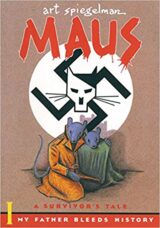
Maus I: A Survivor’s Tale: My Father Bleeds History
The first installment of the Pulitzer Prize-winning graphic novel acclaimed as “the most affecting and successful narrative ever done about the Holocaust” (Wall Street Journal) and “the first masterpiece in comic book history” (The New Yorker).
A brutally moving work of art—widely hailed as the greatest graphic novel ever written—Maus recounts the chilling experiences of the author’s father during the Holocaust, with Jews drawn as wide-eyed mice and Nazis as menacing cats.
Maus is a haunting tale within a tale, weaving the author’s account of his tortured relationship with his aging father into an astonishing retelling of one of history’s most unspeakable tragedies. It is an unforgettable story of survival and a disarming look at the legacy of trauma.

Quicksilver
Quinn Quicksilver was born a mystery—abandoned at three days old on a desert highway in Arizona. Raised in an orphanage, never knowing his parents, Quinn had a happy if unexceptional life. Until the day of “strange magnetism.” It compelled him to drive out to the middle of nowhere. It helped him find a coin worth a lot of money. And it practically saved his life when two government agents showed up in the diner in pursuit of him. Now Quinn is on the run from those agents and who knows what else, fleeing for his life.
During a shoot-out at a forlorn dude ranch, he finally meets his destined companions: Bridget Rainking, a beauty as gifted in foresight as she is with firearms, and her grandpa Sparky, a romance novelist with an unusual past. Bridget knows what it’s like to be Quinn. She’s hunted, too. The only way to stay alive is to keep moving.
Barreling through the Sonoran Desert, the formidable trio is impelled by that same inexplicable magnetism toward the inevitable. With every deeply disturbing mile, something sinister is in the rearview—an enemy that is more than a match for Quinn. Even as he discovers within himself resources that are every bit as scary.

The Comfortable Kitchen: 105 Laid-Back, Healthy, and Wholesome Recipe
What does comfort mean in The Comfortable Kitchen? For Alex Snodgrass, New York Times bestselling author of The Defined Dish, bringing her family around the table to share a home-cooked meal is a favorite way to show love. Her recipes are designed to bring joy into that display of affection, from your own comfort cooking to your loved ones’ delight at the delicious flavors, to knowing that you’re caring for your family’s nutrition with each bite.
Though many of her meals are fully paleo compliant, or at the very least paleo-ish, there are plenty of other recipes with simple, flexible ingredient swaps for a cleaner meal when desired—perfect for people who are enjoying their “food freedom” stage of their health journey. And for those who have dietary restrictions, Alex clearly marks each recipe as gluten-free, dairy-free, grain-free, and paleo, as appropriate.
Alex brings back the joy of being in the kitchen for those at all levels of cooking skill and provides food for every occasion, with soups, salads, pasta, vegetarian and non-vegetarian mains, apps, and sides ranging from one-pot meals to not-so-junky junk food–and even cocktails and desserts–with recipes including:
Cajun Chicken and Wild Rice Soup
Green Curry Poached Halibut with Herbs
Texas Style Brisket Tacos
Herby Green Olive Pasta with Feta
Sheet Pan Honey-Sesame Cauliflower
Clayton’s Margarita
7-Ingredient Almond Butter Cookies
With 105 approachable and nutritious recipes for real, busy life, The Comfortable Kitchen is a must-have cookbook for everyone who cares about what they eat and what they make.

All About Love: New Visions
“The word ‘love’ is most often defined as a noun, yet we would all love better if we used it as a verb,” writes bell hooks as she comes out fighting and on fire in All About Love. Here, at her most provocative and intensely personal, renowned scholar, cultural critic and feminist bell hooks offers a proactive new ethic for a society bereft with lovelessness–not the lack of romance, but the lack of care, compassion, and unity. People are divided, she declares, by society’s failure to provide a model for learning to love.
As bell hooks uses her incisive mind to explore the question “What is love?” her answers strike at both the mind and heart. Razing the cultural paradigm that the ideal love is infused with sex and desire, she provides a new path to love that is sacred, redemptive, and healing for individuals and for a nation. The Utne Reader declared bell hooks one of the “100 Visionaries Who Can Change Your Life.” All About Love is a powerful, timely affirmation of just how profoundly her revelations can change hearts and minds for the better.
